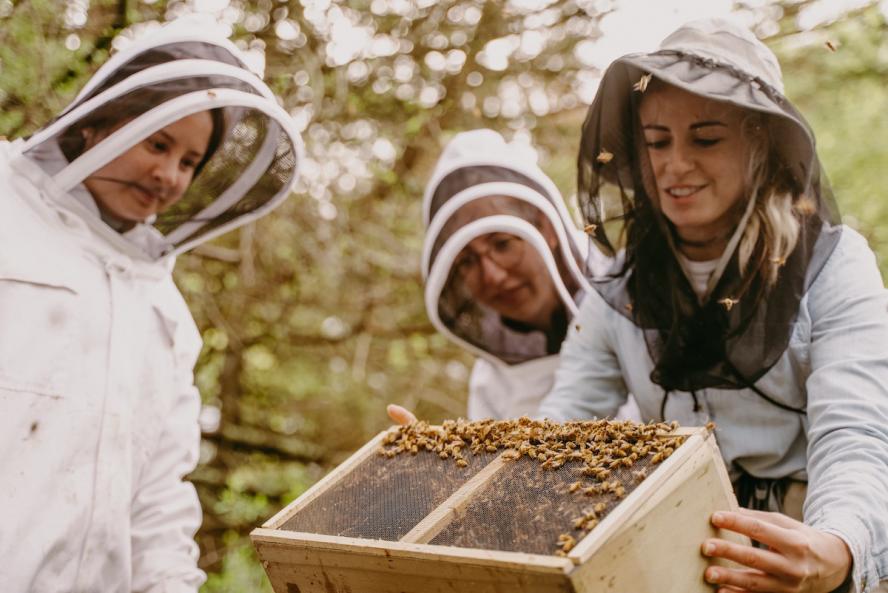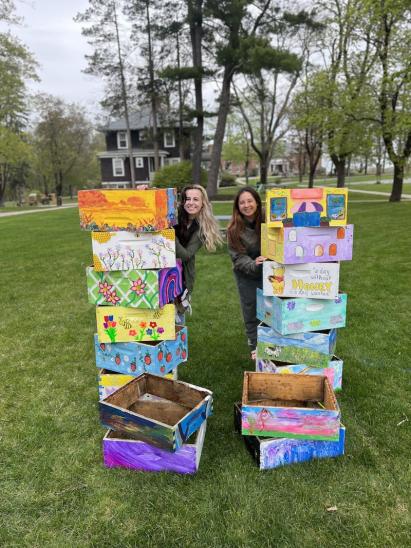-
About
- Leadership & Faculty
- News & Events
-
Admissions
-
Academics
- Graduate
- Advanced Clinical Training
- Continuing Education
- Academic Departments
- Academic Offices
- Simulation Experiences
-
Student Life
- Offices
-
Research
-
- Transformative Research
- Centers & Shared Resources
-
-
Hospitals & Clinics
- Emergency Care
- Hospital Services
-
Community Outreach
- Volunteer
Generating Some Buzz
D.V.M./M.P.H. student restarts beekeeping at Cummings School

Courtney Wallner, V25 (she/her), a former bee researcher and current student in Cummings School of Veterinary Medicine’s D.V.M./M.P.H. dual degree program, is spearheading a restart of the apiary, or beekeeping, project on campus.
“This is literally what I came to Cummings School to do and I’m so excited to have this opportunity and thrilled it’s coming to fruition,” she says.
The need to train more veterinarians to be qualified to work with bees is significant. In 2017, the U.S. Food and Drug Administration began requiring veterinary oversight of antimicrobials used in food-producing animals that are important to human medicine. Since bees are considered among those animals, if a beekeeper seeks to administer antibiotics to their honeybees, either a prescription or a feed directive from a licensed veterinarian is required.
Following the FDA’s announcement, a group of veterinarians united to create the Honey Bee Veterinary Consortium (HBVC), a nonprofit which trains veterinarians in honeybee medicine. A student member of the HBVC, Wallner spent four years as a bee researcher.
A long-time admirer of insects, she developed a passion for beekeeping at the University of Nebraska–Lincoln, earning a B.S. in entomology [the scientific study of insects] under the advisement of Dr. Doug Golick, a native pollinator researcher and educator.
“I fell in love with bees and the importance of insects in our environment and both animal and human health,” she explains, and highlighted this expertise in her Cummings School application. “Although I didn’t have any experience working in a clinic, I addressed the need for people who know how to work with bees in veterinary medicine.”
Cummings School recognized Wallner’s value and has supported her bee journey on campus. “Over the past couple of years, I’ve been on a mission to determine how I can introduce beekeeping to veterinarians.”
Unfortunately, few veterinarians have had proper honeybee training and few veterinary schools offer it as honeybees are not part of the American Veterinary Medical Association’s (AVMA) core curriculum standards for accredited vet schools. “Yet, we are responsible for keeping these animals healthy, and they are integral to our food supply,” says Wallner.
Among approximately 30,000 veterinary clinics in the United States just 30 are “Bee Friendly” (committed to working with beekeepers) and only one operates in Massachusetts—Cummings School Adjunct Assistant Professor Dr. Misty Williams, a collaborator for this project. “Less than one percent of veterinarians are able to serve this clientele,” Wallner admits.
With some funding from the Summer Research Program, and the support of fellow students and faculty members, including Dr. Meera Gatlin, director of the D.V.M./M.P.H. program, and Dr. Gillian Kruskall, V14, a beekeeper who recently presented a honeybee medicine lecture to Cummings School students, the apiary project on campus is restarting.
“I need Dr. Kruskall’s and other bee-friendly vets’ perspectives to help my fellow future veterinarians pursue this in the most responsible and educational way,” says Wallner.
Following a temporary hiatus, the campus hive program will be reignited with a specific emphasis on bee health and good management practices. Working with the Office of Sustainability, Wallner organized a beehive box painting competition on April 29, and the customized boxes were placed on campus hives.
Did you know?
Bees can sometimes get lost returning to their home and use shapes and colors painted on the outside of their hives as a guide. Returning to their home hive helps maintain hygiene and limits hive-to-hive spread of possible infection or disease.
Colonies of bees were picked up May 1 from Autumn Morning Farm Beekeeping Supply in Barre, Massachusetts, and installed in the hives the following day. This summer, Wallner will teach some senior students from Nashoba Valley Technical High School (NVTHS) about how honeybees contribute to environmental and agricultural sustainability. NVTHS students working on a sustainability project will help film Wallner’s creation of educational modules on beekeeping for veterinary professionals.
“The modules intend to guide veterinarians to see insects as patients, not pests,” she explains.
With two years remaining before she graduates, Wallner hopes to eventually arrange with the AVMA to update its curriculum standards to include honeybee instruction, however, her first goal is to reactivate the campus hives so students can learn about bees this fall.
“I hope to incorporate this as an extracurricular club for students to get involved on their own time without worrying about grades,” she explains. “Insects and bugs are really scary to a lot of people and we’re going to show them that bees are often gentle and docile.”
The hives will be led by locally bred queens, a critical component of hive management, which is regionally dependent like most farming and agricultural initiatives, according to Wallner. As for the workers, “we have Italians [a breed of bee] to fill the hives … they’re very gentle, infrequently swarm, and make lots of honey.”
This year, depending on the health of bees, she may harvest honey and other products, such as beeswax, bee pollen, propolis, and royal jelly, which can be used in alternative medicine. The program’s priority, however, is to ensure the bees have vitality and all the resources they need to survive the winter. Therefore, Wallner may wait until next fall to harvest the bee products.
Over the next two years, Wallner hopes to generate enough interest to sustain the hives after she graduates. However, in her contingency plan, she will work with either the Worcester County Beekeepers Association or the Tufts Pollinator Initiative on the Medford campus to transfer ownership, if necessary.
“I’m committed to the success of this project and hope that once we get it running it can continue for many years to come.”
If interested in more information about the campus beekeeping project, email courtney.wallner@tufts.edu or complete this brief beekeeping interest survey.
Department:
D.V.M./M.P.H. Program
